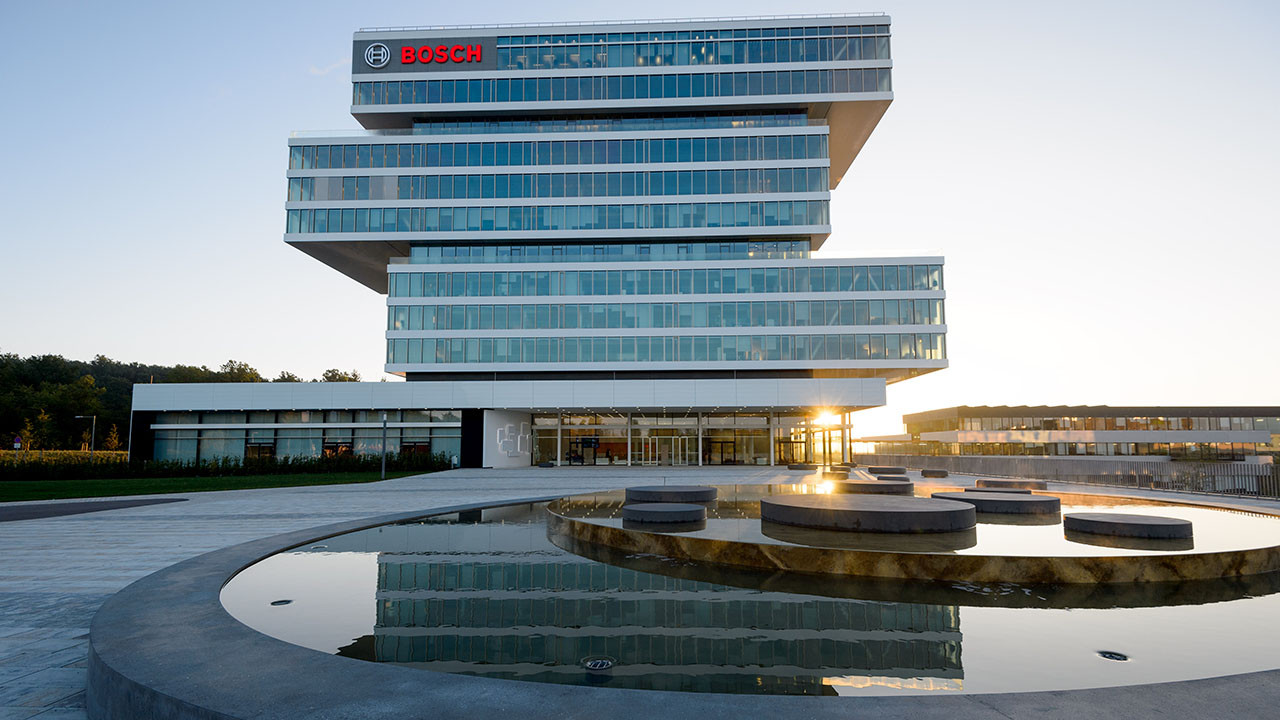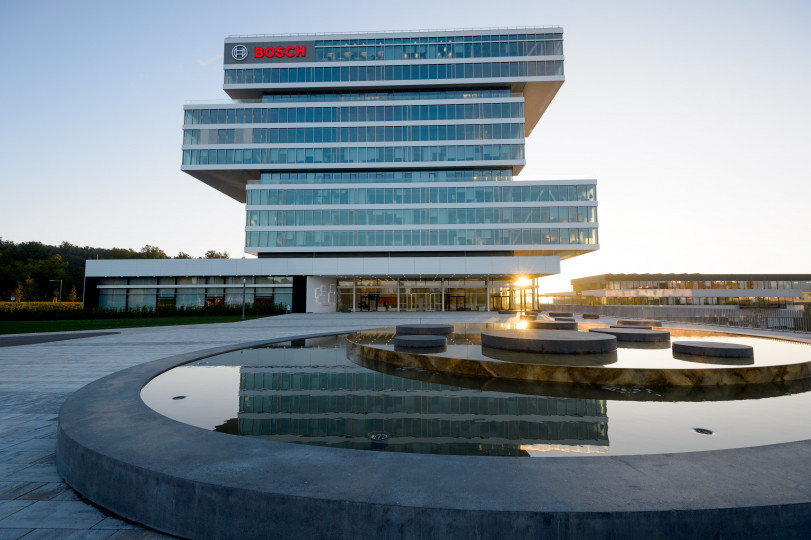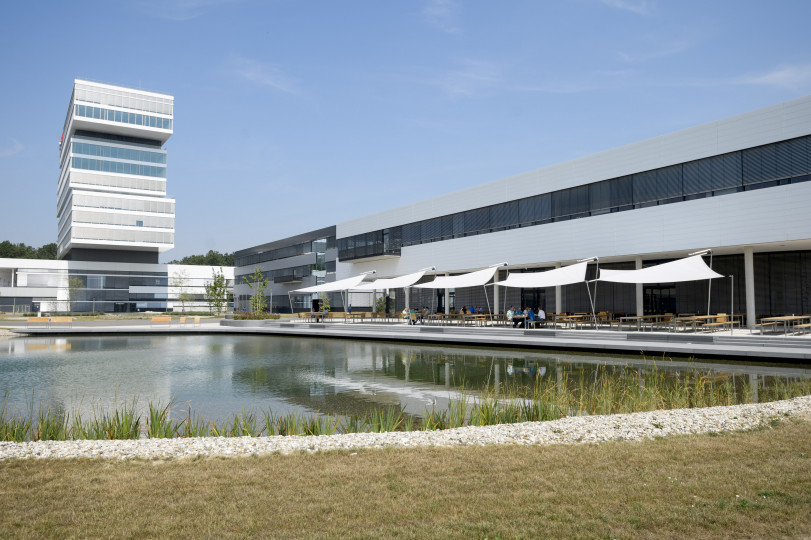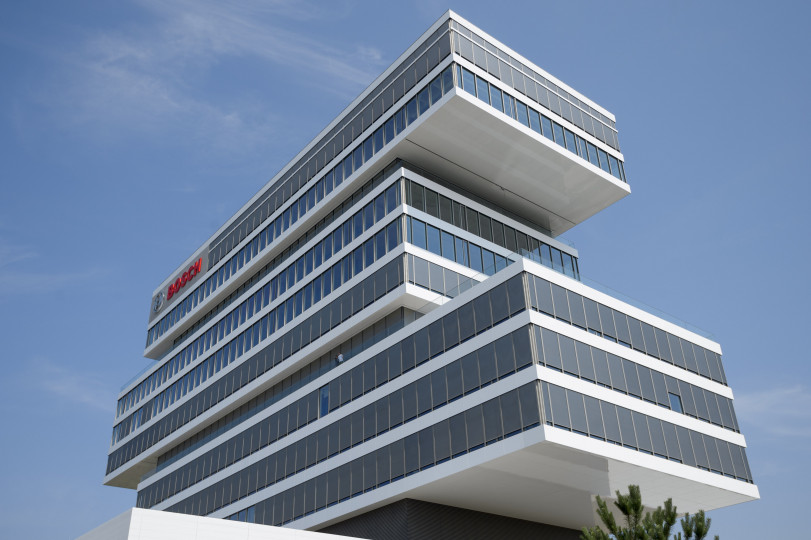Renningen, Germany – A completely new work environment for creative minds: with its Renningen research campus, Bosch wants to encourage interdisciplinary collaboration, and in this way further enhance its innovative stength. At the new center for research and advance engineering on the outskirts of Stuttgart, some 1,700 creative minds are doing applied industrial research. At a ceremony attended by Federal Chancellor Dr. Angela Merkel, Baden-Württemberg Governor Winfried Kretschmann, and many other guests from politics, business, and academia, the research campus has now been officially opened. “Like a university, our campus brings together many faculties. Here, we want our researchers to do more than just think about what the future could bring. We want them to be successful entrepreneurs as well. Renningen is Bosch’s own Stanford. And at the same time, the center is an expression of our faith in Germany as a technology location,” said Dr. Volkmar Denner, chairman of the Bosch board of management. The company has invested some 310 million euros in the new location. The research campus, whose motto is “Connected for millions of ideas,” is the hub of Bosch’s global research and development network. The supplier of technology and services also intends to strengthen the spirit of entrepreneurship there. It is precisely here that Denner sees Germany at a competitive disadvantage. “In Germany, there are neither the opportunities nor the willingness to establish companies. Especially among its young university graduates, we need more start-up spirit. In this respect, universities have to do more than prepare their students for exams in highly specialized fields.”
Innovations for better quality of life
The hope for the future is that even more innovations will be created in Renningen that improve quality of life. The campus brings together many disciplines from science and technology. Whether electrical engineering, mechanical engineering, computer science, analytics, chemistry, physics, biology, or microsystems technology – in Renningen, a total of 1,200 associates in corporate research and advance engineering, plus 500 PhD students and interns, are now working on the technical challenges of the future. Up to now, these researchers were spread over three locations in the greater Stuttgart area.
Technological breadth in research and advance engineering
In the special campus atmosphere, Bosch’s pioneering minds will work on both new products and innovative manufacturing methods. Their work will focus on areas such as software engineering, sensor technology, automation, driver assistance systems, and battery technology, as well as on improved automotive powertrain systems. One area that is becoming increasingly significant is software expertise – particularly for IoT connectivity. “For Germany to stay technologically on top of its game in connectivity, it has to preserve and extend the key competencies of microelectronics and software. If it fails to do this, German industry will be left behind. We have no reason to fear competition with IT companies. But for our industrial enterprises, this competition will not be a walk in the park,” Denner said.
As for Bosch itself, Denner believes it is well prepared for the connectivity trend. For example, the company is not only the global market leader for micromechanical sensors, but has also been extending its software competence for some years now. The Bosch Group now employs more than 15,000 software engineers. Three thousand experts are working on the internet of things alone. Bosch especially sees huge business potential in the services that will arise as a result of connectivity. “If we do not want to let others seize these opportunities, then we have to be even faster and less risk-averse than before,” Denner said. “At an earlier stage than ever before, our engineers have to think like businesspeople. The things that are technically feasible should not only excite our researchers, but our future customers as well.”
Germany has to learn to be daring
Denner added that large enterprises such as Bosch have to create the space in which enterprise and entrepreneurship can flourish. Bosch is leading by example. The company has set up its own start-up platform for new business fields. Denner stressed that if the “Silicon Valley model” really is to be the way forward for Europe, “we have to learn to take risks.” Bosch Start-up GmbH helps Bosch researchers become successful businesspeople. For example, it takes care of things such as premises, financing, and other administrative tasks. In this way, new businesses can focus right from the start on their product and bringing it to market. The Bonirob agricultural robot is one of the first products to emerge in this way. The Bosch start-up Deepfield Robotics developed this robot, which is the size of a compact car, as an aid for plant breeding and crop farming.
The best working conditions for creative ideas
On the expansive research campus, there is plenty of space to test the agricultural robot. Apart from the main building, eleven laboratory and workshop buildings, and two buildings for site maintenance, there is also a modern proving ground for testing driver assistance systems. A networking matrix was used to determine who should occupy the individual buildings. It was based on analyses of how intensively individual disciplines exchange information with each other: The closer units work together, the shorter the physical distance between them on the new campus.
Quiet corners, collaboration zones
Bosch paid particular attention to working conditions in Renningen. Whether inside or out, the researchers will encounter a modern work environment. Essentially, the entire campus is a workplace. “Brainwaves in the fresh air, technology at the water’s edge – all this is possible here in Renningen,” Denner said. Wifi connections are available in every building and everywhere on the grounds. Laptops, tablet computers, and voice over internet mean that work can be done in every corner of the campus. Explaining the idea behind this, Denner said: “In Renningen, we offer our innovation team both quiet corners and zones for collaboration.” Office layouts have been designed on the basis of a comprehensive analysis of the innovation process. When they are exploring ideas, researchers need to have peace and quiet. Later on, exchange and collaboration with others take on more importance. These phases, as well as associates’ wishes, were considered when planning the complex. “Associates want more freedom to use their creativity in research and development – and fewer administrative duties. This is something the employee representatives actively supported,” says Alfred Löckle, chairman of the central and combined works councils. “The days when the design of workplaces was decided from above are over. Our associates spend a lot of time at their workplaces. It’s only right that they should also have a say in their design.” The result of the joint consultation with everyone involved was a completely new office concept. Apart from individual workplaces, 270 meeting rooms of various sizes are the salient characteristic – meaning that there is sufficient room for both focused activity and teamwork. On average, each associate is just ten meters away from the nearest meeting room, and thus possibly also from the next innovative breakthrough.
Mónika Hack
+36 70 510 5516
The Bosch Group is a leading global supplier of technology and services. It employs roughly 360,000 associates worldwide (as per April 1, 2015). The company generated sales of 49 billion euros in 2014.* Its operations are divided into four business sectors: Mobility Solutions, Industrial Technology, Consumer Goods, and Energy and Building Technology. The Bosch Group comprises Robert Bosch GmbH and its roughly 440 subsidiary and regional companies in some 60 countries. Including its sales and service partners, Bosch is represented in roughly 150 countries. This worldwide development, manufacturing, and sales network is the foundation for further growth. In 2014, Bosch applied for some 4,600 patents worldwide. The Bosch Group’s strategic objective is to create solutions for a connected life. Bosch improves quality of life worldwide with products and services that are innovative and spark enthusiasm. In short, Bosch creates technology that is “Invented for life.”
The company was set up in Stuttgart in 1886 by Robert Bosch (1861-1942) as “Workshop for Precision Mechanics and Electrical Engineering.” The special ownership structure of Robert Bosch GmbH guarantees the entrepreneurial freedom of the Bosch Group, making it possible for the company to plan over the long term and to undertake significant up-front investments in the safeguarding of its future. Ninety-two percent of the share capital of Robert Bosch GmbH is held by Robert Bosch Stiftung GmbH, a charitable foundation. The majority of voting rights are held by Robert Bosch Industrietreuhand KG, an industrial trust. The entrepreneurial ownership functions are carried out by the trust. The remaining shares are held by the Bosch family and by Robert Bosch GmbH.
Additional information is available online at www.bosch.hu
*The sales figure disclosed for 2014 does not include the former joint ventures BSH Bosch und Siemens Hausgeräte GmbH (now BSH Hausgeräte GmbH) and ZF Lenksysteme GmbH (now Robert Bosch Automotive Steering GmbH), which have since been taken over completely.







